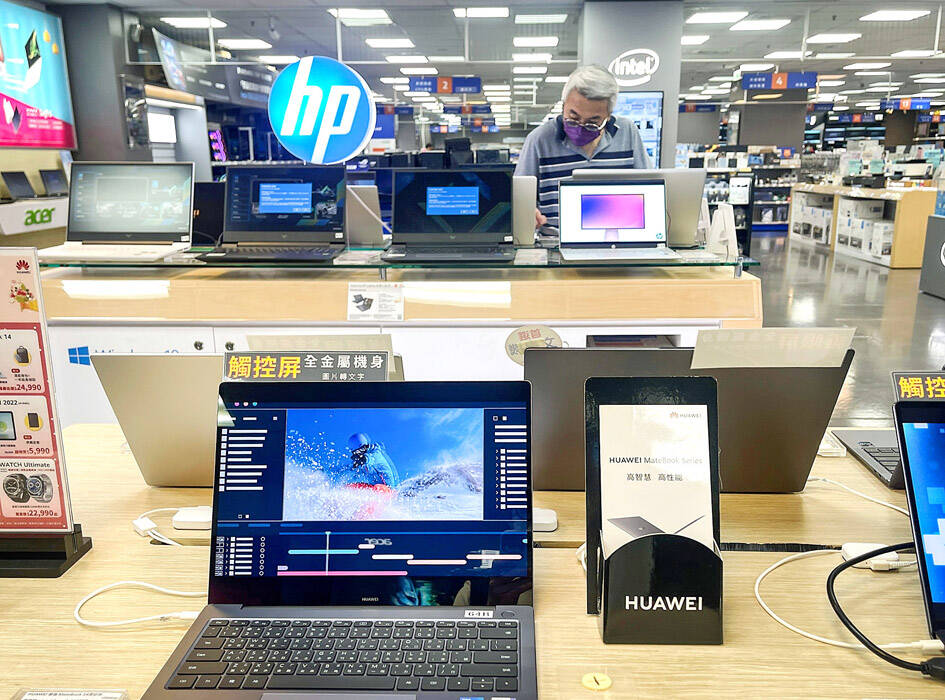The business climate monitor for the manufacturing industry turned “blue” in March, from a revised “yellow-blue” in February, as demand, selling prices and operating conditions weakened, the Taiwan Institute of Economic Research (TIER, 台灣經濟研究院) said yesterday.
The business composite index compiled by the Taipei-based think tank shed 0.56 points to 10.41, reflecting listless manufacturing activity, as global clients continued to adjust inventory amid poor sales.
TIER uses a five-color spectrum to capture the industry’s movements, with “red” indicating a boom, “green” suggesting steady growth and “blue” signifying a downturn. Dual colors indicate a transition to a better or worse condition.

Photo: CNA
Taiwan is home to the world’s leading suppliers of electronics used in smartphones, personal computers, wearables, TVs, vehicles and cloud computing.
A majority of local manufacturers, 51.75 percent, reported a decline in business, while 35.51 percent experienced a soft patch and 12.16 percent held steady, the institute’s monthly survey found.
None experienced a boom, it added.
The findings came even though firms in Taiwan and Asia emerged unscathed from bank failures in the US and Europe, TIER said.
The cost and input readings gained a meager 0.17 and 0.07 points respectively after the global economic slowdown cooled raw material prices and eased cost burdens, the institute said.
However, the gauges for demand, selling prices and overall operating conditions declined further, as inventory corrections dragged on, prompting local manufacturers to cut capacity to protect their margins.
For instance, petrochemical product suppliers opted to conduct annual equipment maintenance after outbound shipments and orders tumbled more than 30 percent from a year earlier, TIER said.
Plastic and rubber product makers saw business shrinking by a similar amount, despite the peak season starting, the institute said.
Tepid market demand in the US and Europe was to blame, but China added to the problem by cutting its dependence on one-off plastic products, it said.
Makers of textile products, while benefiting from rush orders in the wake of China’s reopening, saw sharper declines in production and business orders, as apparel brands turned conservative about inventory, it said.
Paper product vendors had a mixed showing, as a recovery in tourism and commerce boosted demand for shopping and packaging bags, but paper products for industrial use floundered, the institute said.
Vehicle sales picked up after chip shortages came to an end, enabling local suppliers of auto parts to report steady business growth, it said.

MULTIFACETED: A task force has analyzed possible scenarios and created responses to assist domestic industries in dealing with US tariffs, the economics minister said The Executive Yuan is tomorrow to announce countermeasures to US President Donald Trump’s planned reciprocal tariffs, although the details of the plan would not be made public until Monday next week, Minister of Economic Affairs J.W. Kuo (郭智輝) said yesterday. The Cabinet established an economic and trade task force in November last year to deal with US trade and tariff related issues, Kuo told reporters outside the legislature in Taipei. The task force has been analyzing and evaluating all kinds of scenarios to identify suitable responses and determine how best to assist domestic industries in managing the effects of Trump’s tariffs, he

TIGHT-LIPPED: UMC said it had no merger plans at the moment, after Nikkei Asia reported that the firm and GlobalFoundries were considering restarting merger talks United Microelectronics Corp (UMC, 聯電), the world’s No. 4 contract chipmaker, yesterday launched a new US$5 billion 12-inch chip factory in Singapore as part of its latest effort to diversify its manufacturing footprint amid growing geopolitical risks. The new factory, adjacent to UMC’s existing Singapore fab in the Pasir Res Wafer Fab Park, is scheduled to enter volume production next year, utilizing mature 22-nanometer and 28-nanometer process technologies, UMC said in a statement. The company plans to invest US$5 billion during the first phase of the new fab, which would have an installed capacity of 30,000 12-inch wafers per month, it said. The

Taiwan’s official purchasing managers’ index (PMI) last month rose 0.2 percentage points to 54.2, in a second consecutive month of expansion, thanks to front-loading demand intended to avoid potential US tariff hikes, the Chung-Hua Institution for Economic Research (CIER, 中華經濟研究院) said yesterday. While short-term demand appeared robust, uncertainties rose due to US President Donald Trump’s unpredictable trade policy, CIER president Lien Hsien-ming (連賢明) told a news conference in Taipei. Taiwan’s economy this year would be characterized by high-level fluctuations and the volatility would be wilder than most expect, Lien said Demand for electronics, particularly semiconductors, continues to benefit from US technology giants’ effort

‘SWASTICAR’: Tesla CEO Elon Musk’s close association with Donald Trump has prompted opponents to brand him a ‘Nazi’ and resulted in a dramatic drop in sales Demonstrators descended on Tesla Inc dealerships across the US, and in Europe and Canada on Saturday to protest company chief Elon Musk, who has amassed extraordinary power as a top adviser to US President Donald Trump. Waving signs with messages such as “Musk is stealing our money” and “Reclaim our country,” the protests largely took place peacefully following fiery episodes of vandalism on Tesla vehicles, dealerships and other facilities in recent weeks that US officials have denounced as terrorism. Hundreds rallied on Saturday outside the Tesla dealership in Manhattan. Some blasted Musk, the world’s richest man, while others demanded the shuttering of his